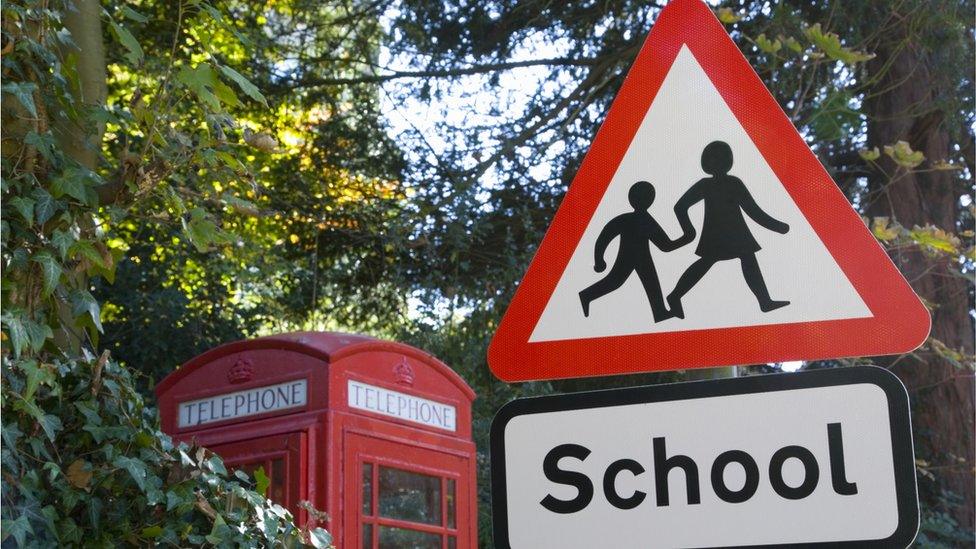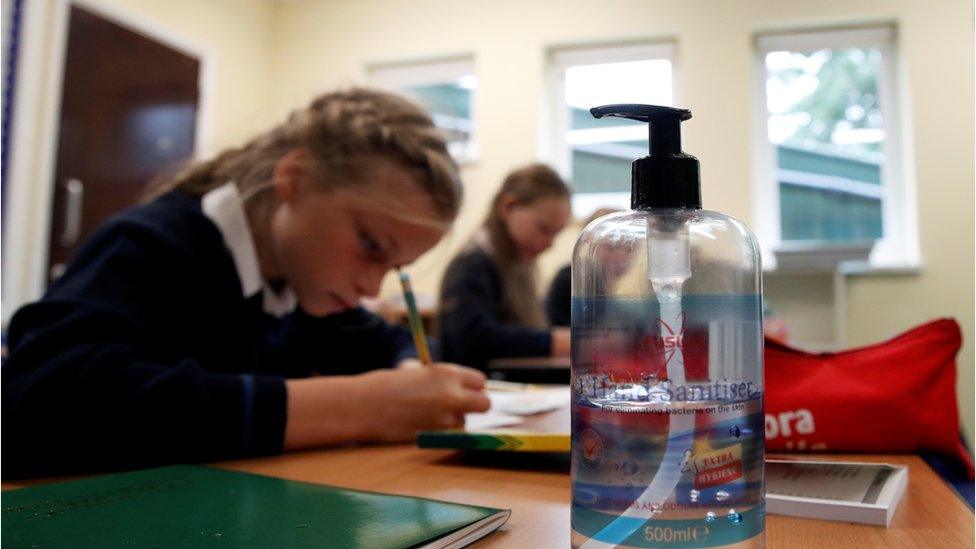More children in England missing school over Covid-19
- Published
- comments

More children are missing out on their education, as the rate of attendance falls across England's schools.
The percentage of pupils attending primary and secondary schools fell to 86% last week down from 89% the previous week, government data shows.
The Northern Powerhouse, a group working to redress North-South economic imbalance, says pupils in the North face the most disruption over Covid-19.
The government said some pupils were self-isolating "as we would expect".
The Department for Education said 55% of secondaries and 20% of primaries in England reported having one or more pupils self-isolating due to potential contact with a case of coronavirus in the school.
This is up from 46% and 16% respectively on the previous week.
Overall attendance at primary school fell from 92% in the week ending 15 October to 90% in the week ending 22 October.
But the drop on the previous week's attendance was most significant in secondary schools, falling from 87% to 83%.

If you are a parent tell us how your child has experienced school disruption:
WhatsApp: +44 7756 165803, external
Tweet: @BBC_HaveYourSay, external
Please read our terms & conditions and privacy policy

However, "the vast majority of these schools remain open to most pupils", the DfE said.
Geoff Barton, head of the school leaders' union ASCL, said the figures painted a "grim picture of the increasingly challenging picture facing schools".
Children in the north
As attendance rates fall, there are growing concerns that pupils in the north of England are missing more school than their peers in other parts of the country.
Analysis from the North West Association of the Directors of Children's Services, seen exclusively by the BBC, reveals the pressures.
In mid-October Bury, Knowsley, Liverpool and Manchester all had more than 40% of schools with confirmed cases - some of these were among teachers.
According to the report, which is based on a snapshot of 16 October, there were 710 teachers with a positive test for coronavirus in the North West - this was 35% of the total of confirmed cases among teachers across England on that day.
The Northern Powerhouse wants next year's exams ditched in favour of coursework, saying pupils in the north of England had been particularly badly affected by disruption to their schooling.
But the government says exams are "the fairest way" of judging performance and ministers have said exams will go ahead in summer 2021, with a three-week delay.

About eight million pupils in England were sent home in March
It pointed out that some areas in the North had attendance rates for secondary school as low as 61%, whereas others in the South were close to the usual national figure of 95%.
It added: "We appreciate the government's desire to try and keep things as normal as possible, but this is now unrealistic in many northern communities.
"We urge the government to commit to continuous assessment as it is a fairer alternative to the proposed examination plan."
The government is consulting on contingency measures to manage any disruption to GCSEs, A-levels and BTecs in 2021, and has said it will produce plans before Christmas.
A DfE spokesperson said: "Exams are the fairest way of judging a student's performance, which is why they will go ahead next year, underpinned by contingency measures developed in partnership with the sector.
"Over the coming weeks we will jointly identify any risks to exams and the measures needed to address potential disruption, with fairness for students continuing to be our priority."
The spokesperson added that schools had plans in place to deliver remote education for self-isolating pupils and the government was providing an initial additional allocation of 150,000 devices for eligible children.
The CEO of Ormiston Academy Trust, Nick Hudson, urged the government to publish data on attendance broken down by local authority, amid concern that pupils in the worst-affected areas might be falling further behind.
"To be fair to young people the data needs to be transparent, then we can ensure that we put as much equity into the system, especially those sitting exams," he said.
"If we experience the same levels of staff absence as we have in the first half-term between now and the end of term, it would be very difficult to ensure consistent education for all of our pupils in all of our schools - that would mean looking at the possibility of rotas."